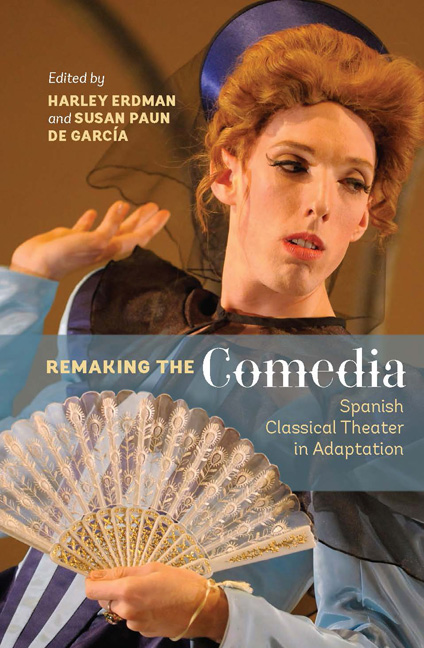Book contents
- Frontmatter
- Contents
- Illustrations
- Contributors
- Preface
- Note to the Reader
- Acknowledgements
- PART I THEORIZING
- PART II SURVEYING
- PART III SPOTLIGHTING
- 11 The Dog in the Manger: The Continuum of Transformation
- 12 El caballero de Olmedo: Los Barracos's Baroque Gentleman
- 13 Corpus Lorqui: Transformation and Transubstantiation in Los Barracos de Federico’s El caballero de Olmedo
- 14 The Phoenix of Madrid: Calderón's No hay burlas con el amor Reborn in Bath
- 15 A Prince in Pittsburgh: “Recasting” a Contemporary Staging of The Constant Prince
- 16 Directing Marta the Divine: Provocative Choices in the Service of the Story
- 17 The Dramaturgy of Absence: Minding the Gaps in Tirso de Molina, Ana Caro, and Feliciana Enríquez
- 18 Translations and Transgressions: Twenty-First-Century Questions Regarding Zayas
- 19 Comedia Actresses, Then and Now: The Case of Ana Caro's Valor, agravio y mujer
- 20 “Kinesthetic Empathy” and the Comedia refundición
- PART IV SHIFTING
- Play Titles Cited
- Works Cited
- Index
11 - The Dog in the Manger: The Continuum of Transformation
from PART III - SPOTLIGHTING
Published online by Cambridge University Press: 05 December 2015
- Frontmatter
- Contents
- Illustrations
- Contributors
- Preface
- Note to the Reader
- Acknowledgements
- PART I THEORIZING
- PART II SURVEYING
- PART III SPOTLIGHTING
- 11 The Dog in the Manger: The Continuum of Transformation
- 12 El caballero de Olmedo: Los Barracos's Baroque Gentleman
- 13 Corpus Lorqui: Transformation and Transubstantiation in Los Barracos de Federico’s El caballero de Olmedo
- 14 The Phoenix of Madrid: Calderón's No hay burlas con el amor Reborn in Bath
- 15 A Prince in Pittsburgh: “Recasting” a Contemporary Staging of The Constant Prince
- 16 Directing Marta the Divine: Provocative Choices in the Service of the Story
- 17 The Dramaturgy of Absence: Minding the Gaps in Tirso de Molina, Ana Caro, and Feliciana Enríquez
- 18 Translations and Transgressions: Twenty-First-Century Questions Regarding Zayas
- 19 Comedia Actresses, Then and Now: The Case of Ana Caro's Valor, agravio y mujer
- 20 “Kinesthetic Empathy” and the Comedia refundición
- PART IV SHIFTING
- Play Titles Cited
- Works Cited
- Index
Summary
By Way of Theoretical Introduction
Translation remains subject to multiple abuse, not least in terms of reception and understanding, by readers and critics who see the act of translation as the re-creation of an invariant truth or truths contained within the textual boundaries of the original, and who therefore think of the product of that process as linked to the original through a paradigm of sameness. Equivalence is taken here at face value, with the result that any formal or semantic deviation is, at best, regarded as a necessary evil and, at worst, chastised as a wilful perversion. These observations may be considered a well-rehearsed impertinence by some, or, by others, a simple defence of translation as an interpretative act. Every act of translation, of course, is rooted in the search for equivalence; but if we accept the notion of translation as a hermeneutic process whose method is interpretative rather than an act of close-reading which furnishes, in I. A. Richards's item of philological faith, the “complete viewing” of text (249), then the paradigm of equivalence that emerges is one that is multiple—in other words, one that is subject to, as well as the consequence of, a range of applied interpretative choices and decisions. In that regard, any commission or skopos, in the sense of applying a variable purpose to the act of translation, are in themselves interpretative acts in that they propose differentiated versions of the same original text: translations that are one possible version among many, and that are arrived at through choices whose determinants may be both conscious and unconscious, more deeply embedded in this latter case within the black-box of the translator's mind. Effectively, while every translator seeks equivalence, it is usually only equivalence of a kind, because those theatre translators whose work emerges from creative engagement with text, whose process is the writing forward of the quality of their reading experience, will understand that any strategy of equivalence emerges from both the complexity of the translator's lived experience, cumulative and current, ongoing and everchanging, and from the ways in which the travelling text connects with that experience.
- Type
- Chapter
- Information
- Remaking the ComediaSpanish Classical Theater in Adaptation, pp. 105 - 116Publisher: Boydell & BrewerPrint publication year: 2015



